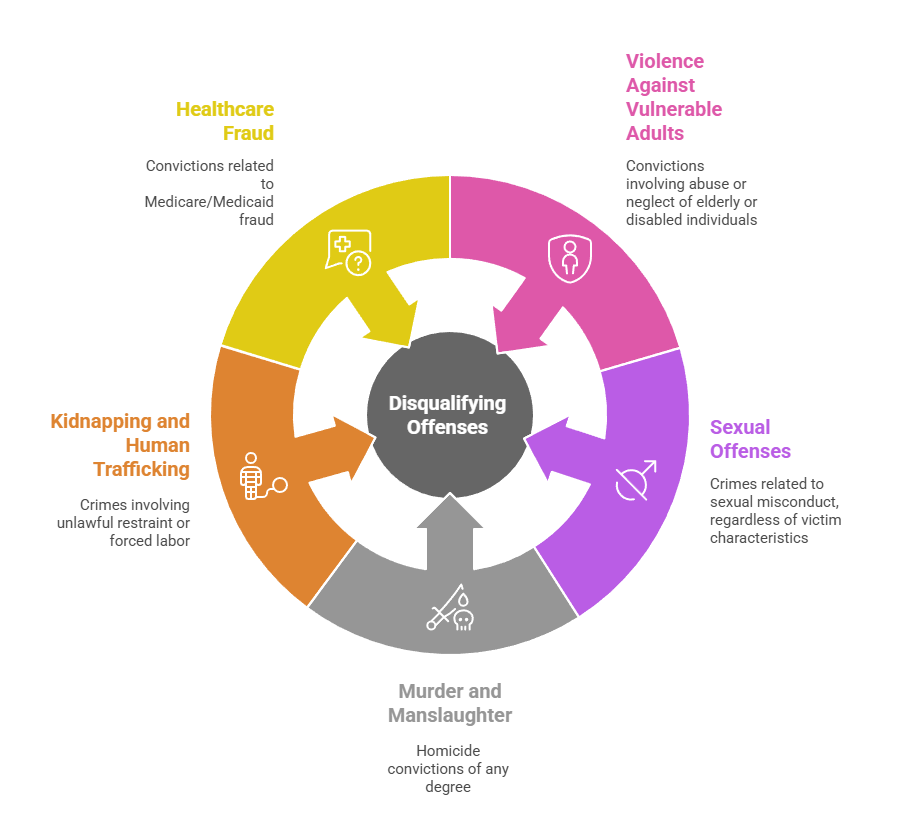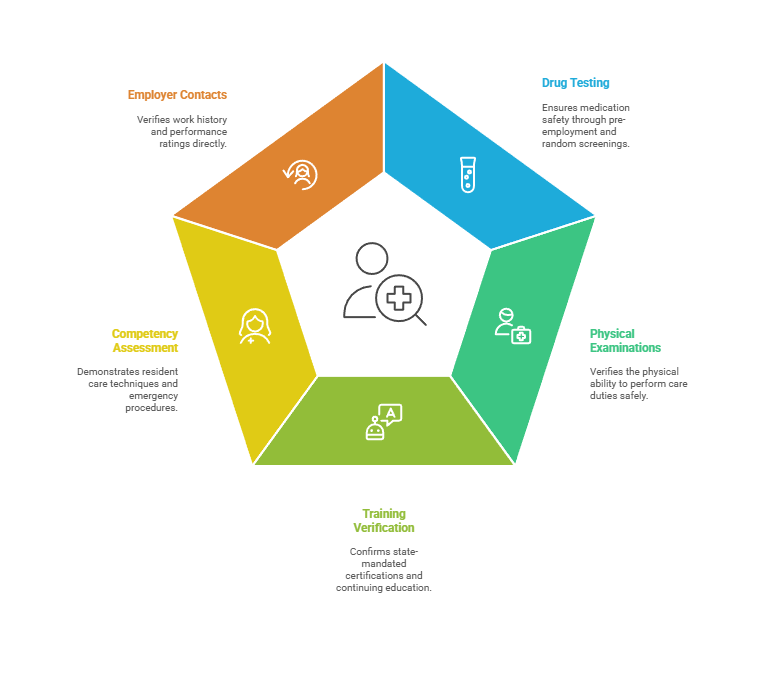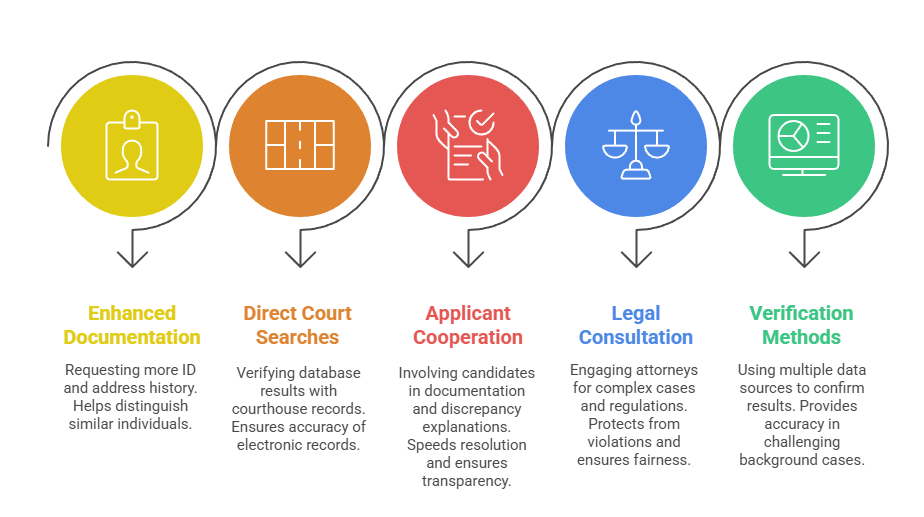Texas nursing homes must conduct comprehensive background checks on all employees as mandated by state regulations and federal requirements. These screenings include criminal history verification, abuse registry searches, and professional license validation to protect vulnerable residents.
Key Takeaways
- Texas nursing homes are legally required to perform multi-level background checks including criminal history, OIG exclusion lists, and state abuse registries before hiring any employee.
- The background check process typically takes 7-14 business days and costs between $25-75 per screening depending on the comprehensiveness of the search.
- Certain criminal convictions create permanent employment barriers in Texas nursing homes, while others may be evaluated on a case-by-case basis depending on the nature and timeframe of the offense.
- Healthcare workers must maintain clean background check status throughout employment, with many facilities conducting annual re-screenings and ongoing monitoring.
- Both direct care staff and administrative employees working in nursing home facilities must complete the same rigorous background verification process.
- Job applicants should prepare for extensive documentation requirements including fingerprinting, employment history verification, and professional reference checks as part of the standard hiring process.
Legal Requirements for Texas Nursing Home Employee Screening
Texas nursing homes operate under strict regulatory oversight. These rules mandate comprehensive employee background screening programs. The Texas Health and Safety Code Chapter 242 establishes foundational requirements for nursing facility staffing standards.
Additionally, federal regulations from the Centers for Medicare & Medicaid Services provide extra layers of compliance obligations. These regulations exist to protect vulnerable elderly residents. Residents depend on qualified, trustworthy caregivers for daily needs and medical care.
The state requires all nursing home employees to undergo criminal background checks before beginning employment. This requirement applies regardless of their specific role within the facility. Direct care staff such as certified nursing assistants and licensed vocational nurses must complete these checks. Administrative personnel, dietary workers, maintenance staff, and contracted service providers also need clearance if they have regular access to resident areas.
Background Check Requirements Texas Healthcare Facilities Must Follow:
| Check Type | Description |
| State Criminal History | Complete Texas criminal record search covering all counties |
| Federal Criminal Database | Multi-jurisdictional criminal history verification across states |
| Sex Offender Registry | National and state-level sex offender database searches |
| OIG Exclusion List | Office of Inspector General healthcare fraud screening |
| Abuse Registry Check | Texas Department of Family and Protective Services database review |
| Professional License Verification | Current certification and disciplinary history review |
These comprehensive screening requirements help ensure only qualified individuals provide care to nursing home residents. Texas facilities must maintain documentation proving each employee's eligibility to work in healthcare settings throughout their employment.
Types of Background Checks Required
Criminal History Verification
Texas nursing home background checks must include comprehensive criminal history searches. These searches cover both state and federal databases thoroughly. Facilities typically use FBI-approved fingerprinting services to ensure accurate identification and complete criminal record retrieval.
The process examines felony and misdemeanor convictions carefully. It also reviews pending charges and arrest records from all jurisdictions where the applicant has lived or worked. Most healthcare employers in Texas require criminal background verification covering a minimum of seven years.
However, many facilities extend searches to include the applicant's entire adult criminal history. This thorough approach helps identify patterns of behavior that might pose risks to vulnerable nursing home residents. Employee screening texas healthcare facilities use follows strict protocols to ensure accuracy and completeness.
Professional License and Certification Checks
Healthcare workers must maintain current, unrestricted professional licenses appropriate to their job responsibilities. Texas nursing homes verify licenses through state regulatory boards. These include the Texas Board of Nursing, Texas Medical Board, and other relevant professional oversight agencies.
License Verification Components:
- Active License Status: Confirmation of current, unrestricted professional credentials without limitations
- Disciplinary History: Review of any sanctions, suspensions, or restrictions placed on the license
- Scope of Practice: Verification that license permits intended job duties and responsibilities
- Expiration Dates: Ensuring licenses remain valid throughout the expected employment period
These verifications confirm active license status and identify any disciplinary actions. They also ensure compliance with continuing education requirements that maintain professional competency.
Registry and Database Screenings
Texas nursing homes must search multiple specialized databases designed to identify prohibited individuals. The Office of Inspector General's List of Excluded Individuals and Entities prevents employment of workers sanctioned for healthcare fraud or abuse. Additionally, facilities check the Texas Department of Family and Protective Services' Employee Misconduct Registry.
This registry tracks substantiated cases of abuse, neglect, or exploitation in care settings. These registry searches require ongoing monitoring throughout employment. New exclusions and sanctions are added regularly to these databases.
Many facilities implement automated monitoring systems to receive immediate alerts. These alerts notify administrators if current employees appear on restricted lists. This proactive approach helps maintain continuous compliance with regulatory requirements.
Disqualifying Criminal Offenses
Texas law establishes specific criminal offenses that create automatic employment barriers for nursing home workers. These disqualifying convictions reflect the state's commitment to protecting vulnerable adults. The restrictions target individuals with histories of violence, abuse, or exploitation specifically.
Understanding these restrictions helps job seekers assess their eligibility before beginning the application process. However, facilities often apply stricter standards than legally required. They maintain significant discretion in making employment decisions based on their internal policies.
Offense Categories and Employment Impact:

- Violence Against Vulnerable Adults: Any conviction involving abuse, neglect, or exploitation of elderly or disabled individuals results in permanent disqualification from nursing home employment.
- Sexual Offenses: All sex-related crimes create permanent barriers regardless of timeframe or victim characteristics, ensuring comprehensive protection for vulnerable residents.
- Murder and Manslaughter: Homicide convictions of any degree or classification prevent employment in healthcare settings due to the serious nature of these crimes.
- Kidnapping and Human Trafficking: Crimes involving unlawful restraint or forced labor demonstrate patterns of exploitation that conflict with caregiving responsibilities.
- Healthcare Fraud: Convictions related to Medicare/Medicaid fraud or healthcare billing schemes indicate dishonesty in medical settings and result in permanent exclusion.
Certain other criminal convictions may be evaluated individually based on various factors. These factors include the nature of the offense and time elapsed since conviction. Evidence of rehabilitation and relevance to job duties also influence decisions.
Texas criminal background check processes also examine pending charges and arrests that did not result in convictions. While these matters cannot automatically disqualify applicants, nursing homes may postpone hiring decisions. They often require additional documentation explaining the circumstances surrounding these incidents.
Background Check Process and Timeline
The employee screening process follows a structured timeline that balances thoroughness with operational efficiency. Most nursing homes begin background checks immediately after extending conditional job offers. This timing allows comprehensive verification while maintaining candidate engagement throughout the process.
The process typically requires 7-14 business days for completion. However, complex cases involving multiple jurisdictions or incomplete records may extend longer. Facilities provide estimated completion dates during the initial application process to manage expectations.
Processing Timeline Breakdown:
| Stage | Duration | Key Activities |
| Initial Submission | 1-2 days | Fingerprinting, application processing, fee payment |
| Database Searches | 3-7 days | Criminal history, registry checks, license verification |
| Results Review | 2-3 days | HR evaluation, legal compliance assessment |
| Final Decision | 1-2 days | Employment authorization or disqualification notice |
Applicants must provide extensive documentation during the initial submission phase. Required documents include government-issued identification, Social Security cards, and employment authorization documents. Professional licenses and certifications must also be submitted for verification.
Many facilities require in-person fingerprinting at approved locations. This requirement adds scheduling coordination to the timeline. The nursing background verification process includes multiple checkpoints where HR personnel review preliminary results.
Staff may request additional information when needed during these reviews. This thorough approach ensures accuracy while providing opportunities to address discrepancies. Incomplete records can be resolved before making final employment decisions.
Costs and Financial Considerations
Healthcare worker screening texas facilities implement involves various costs. These expenses may be allocated between employers and job applicants depending on facility policies. Most comprehensive background check packages range from $25-75 per applicant.
Premium services including additional database searches and ongoing monitoring capabilities command higher fees. However, the investment typically generates positive returns through reduced turnover and improved regulatory compliance. Enhanced resident safety outcomes also justify these expenses.
Cost Structure Analysis:
- Basic Criminal History: $15-25 per search covering state and county records provides fundamental screening but may miss federal or out-of-state convictions.
- Federal Database Access: $10-20 additional for multi-jurisdictional criminal searches ensures comprehensive coverage across all states where applicants have lived.
- Professional License Verification: $5-15 per license or certification checked confirms current standing and identifies any disciplinary actions or restrictions.
- Fingerprinting Services: $10-30 depending on location and processing method, with digital fingerprinting typically costing more than traditional ink methods.
- Ongoing Monitoring: $2-8 monthly for automated database alert systems that provide real-time notifications of new criminal activity or regulatory changes.
Some Texas nursing homes absorb all background check costs as part of their recruitment investment. This approach removes financial barriers for qualified candidates. Others require applicants to pay fees upfront or reimburse successful candidates after hiring.
Facilities often negotiate volume discounts with screening providers to reduce per-check expenses. These arrangements help maintain comprehensive verification standards while controlling costs. The financial investment in thorough background screening serves as essential risk management rather than optional hiring procedures.
Background Check Requirements by Employee Type

Direct Care Staff Screening
Certified nursing assistants, licensed vocational nurses, and other direct care providers face the most stringent requirements. Their intimate access to vulnerable residents necessitates comprehensive screening protocols. These healthcare workers undergo extended criminal history searches and detailed employment verification.
Enhanced Screening Elements:

- Drug Testing: Pre-employment and random drug screening to ensure medication safety
- Physical Examinations: Health clearances confirming ability to perform care duties safely
- Specialized Training Verification: State-mandated certification and continuing education confirmation
- Competency Assessment: Demonstration of resident care techniques and emergency procedures
- Previous Healthcare Employer Contacts: Direct verification of work history and performance ratings
These positions also require current CPR certification and completion of state-mandated training programs. Background verification often includes contacting previous healthcare employers to assess performance in similar care settings.
Administrative and Support Staff Requirements
Administrative personnel, dietary workers, housekeeping staff, and maintenance employees complete the same core requirements as direct care workers. Texas regulations do not differentiate screening requirements based on job duties within nursing facilities. This uniform approach ensures comprehensive security for all operational areas.
Support staff positions may have slightly expedited processing timelines. They typically do not require professional license verification like clinical staff. However, all employees must demonstrate reliability, trustworthiness, and commitment to resident welfare.
Identity verification confirms legal work authorization status for all positions. Employment history verification includes checking references from previous employers. Registry searches still apply to ensure no exclusions or abuse findings exist.
Ongoing Monitoring and Re-screening Programs
Texas nursing homes increasingly implement continuous monitoring systems throughout employment. These automated systems track employee criminal activity and regulatory status changes in real-time. They provide immediate alerts when current employees are arrested, convicted, or added to exclusion databases.
This proactive approach helps facilities maintain compliance before issues impact resident safety. Monthly database updates ensure current information about all staff members. Professional license tracking monitors credential renewal and disciplinary actions automatically.
Continuous Monitoring Components:
| Monitoring Type | Frequency | Purpose |
| Criminal Database Updates | Monthly | Identify new arrests, charges, or convictions |
| Professional License Tracking | Quarterly | Monitor renewals, disciplinary actions, restrictions |
| Exclusion List Monitoring | Monthly | Check for new OIG or state exclusions |
| Incident Reporting Review | As needed | Evaluate self-disclosed legal proceedings |
Annual re-screening has become standard practice in many Texas healthcare facilities. Employees undergo updated background checks on their employment anniversary dates. This process focuses on new criminal activity and regulatory changes rather than comprehensive historical reviews.
Employees must promptly report any arrests, charges, or legal proceedings during employment. Failure to disclose required information often results in immediate termination. The severity or outcome of the underlying offense may not matter if disclosure requirements are violated.
Common Challenges and Practical Solutions
Background check processes face various obstacles that can delay hiring or create compliance complications. Incomplete criminal records present frequent challenges for HR departments. Name discrepancies and outdated database information require additional verification steps that extend processing timelines.
HR departments must balance thoroughness with efficiency while maintaining legal compliance. Applicants with common names experience extended verification periods. Those who have lived in multiple states also face longer processing times.
Additionally, court closures and database maintenance can impact result availability. Jurisdictional variations create inconsistencies in record access and formatting. These factors require flexible approaches to maintain screening effectiveness.
Resolution Strategies for Common Issues:

- Enhanced Documentation Requests: Requiring additional identification and comprehensive address history helps distinguish between individuals with similar names and backgrounds.
- Direct Court Searches: Supplementing database results with courthouse record verification ensures accuracy when electronic records appear incomplete or inconsistent.
- Applicant Cooperation Programs: Involving candidates in gathering documentation and explaining discrepancies speeds resolution while ensuring transparency in the process.
- Legal Consultation Access: Engaging employment attorneys for complex cases or unclear regulations protects facilities from compliance violations while ensuring fair treatment.
- Alternative Verification Methods: Using multiple data sources to confirm or contradict database results provides comprehensive accuracy in challenging cases.
Successful nursing homes develop standardized procedures for addressing common screening challenges. They maintain flexibility to handle unique situations that don't fit standard protocols. These approaches minimize delays while ensuring thorough verification of all employment candidates.
Employer Policies and Best Practices
Leading Texas nursing homes implement comprehensive background check policies that exceed minimum legal requirements. These policies establish clear procedures for handling various scenarios that arise during screening processes. They also provide consistent frameworks for making employment decisions based on background check results.
Effective policies address timing of background checks in the hiring process. They specify required documentation and establish appeal procedures for adverse decisions. Clear communication protocols help candidates understand requirements and timelines throughout the process.
Policy Development Considerations:
- Documentation Standards: Establishing specific requirements for acceptable forms of identification, employment history verification, and supporting materials ensures consistent application across all candidates.
- Decision-Making Criteria: Creating objective standards for evaluating criminal history, professional violations, and other adverse findings helps ensure fair and legally compliant employment decisions.
- Communication Protocols: Developing clear procedures for notifying candidates about screening requirements, timelines, and results maintains transparency and reduces anxiety during the hiring process.
Many facilities create partnerships with reputable background screening companies that specialize in healthcare employment verification. These partnerships often include volume discounts, expedited processing, and enhanced customer service. Specialized providers understand healthcare-specific requirements better than general screening companies.
Regular policy reviews ensure continued compliance with changing regulations. Staff training on background check procedures helps maintain consistency across different hiring managers. Documentation of all screening decisions protects facilities during regulatory audits and legal challenges.
Compliance Monitoring and Regulatory Updates
Texas nursing home regulations continue evolving as lawmakers and regulators respond to emerging challenges in long-term care. Facilities must stay current with changing requirements at both state and federal levels. Regular compliance audits help identify gaps in screening procedures before they become violations.
The Centers for Medicare & Medicaid Services periodically updates guidance on background check requirements. State regulations may also change based on legislative actions or regulatory agency policy updates. Successful facilities establish monitoring systems to track these changes proactively.
Professional associations and industry groups provide valuable resources for staying informed about regulatory developments. Legal counsel specializing in healthcare employment law offers guidance on complex compliance issues. Regular training ensures staff understand current requirements and proper procedures.
Compliance Maintenance Strategies:
- Regulatory Monitoring Services: Subscribing to professional services that track and summarize regulatory changes ensures timely awareness of new requirements without constant manual research.
- Industry Association Participation: Active involvement in professional organizations provides early insights into pending regulatory changes and best practices from other facilities.
- Legal Review Processes: Regular consultation with healthcare employment attorneys helps identify potential compliance risks and develop appropriate policy responses before violations occur.
Documentation plays a crucial role in demonstrating compliance during regulatory surveys. Facilities must maintain detailed records of all background check procedures and decisions. These records should include timelines, decision rationales, and any corrective actions taken when issues arise.
Internal auditing programs help identify compliance gaps before external reviewers find them. Regular policy reviews ensure procedures remain current with changing regulations. Staff training records demonstrate ongoing commitment to proper implementation of background check requirements.
Conclusion
Texas nursing home background check requirements serve as critical safeguards for protecting vulnerable residents while ensuring healthcare facilities maintain qualified staff. The comprehensive screening process reflects the state's commitment to elderly care safety and regulatory compliance. These requirements continue evolving as technology advances and regulations adapt to emerging challenges. Understanding current requirements helps job seekers prepare effectively while assisting employers in developing robust screening programs that balance thoroughness with operational efficiency to maintain the highest safety standards for residents.
Frequently Asked Questions
How long do Texas nursing home background checks take to complete?
Most Texas nursing home background checks require 7-14 business days for completion. The timeline depends on the complexity of the applicant's history and the comprehensiveness of the screening package. Simple cases with clear records may process faster, while applicants with extensive work history across multiple states or common names requiring additional verification may experience longer timelines. Facilities often provide estimated completion dates during the initial application process to help candidates plan accordingly.
What criminal convictions permanently disqualify someone from working in Texas nursing homes?
Texas law permanently bars individuals with convictions for violence against vulnerable adults, sexual offenses, murder, manslaughter, kidnapping, human trafficking, and healthcare fraud from nursing home employment. These restrictions apply regardless of how much time has passed since the conviction or evidence of rehabilitation. Other criminal history may be evaluated individually based on factors including offense nature, rehabilitation evidence, and relevance to job duties, but facilities maintain discretion to apply stricter standards than legally required.
Do all nursing home employees need the same background check regardless of their job duties?
Yes, Texas regulations require all nursing home employees to complete the same core background check requirements regardless of their specific role within the facility. This includes direct care staff, administrative personnel, dietary workers, housekeeping, maintenance, and contracted service providers with regular facility access. The state does not differentiate screening requirements based on job duties, ensuring comprehensive security for all areas of nursing home operations and resident protection.
How much do nursing home background checks cost in Texas?
Comprehensive nursing home background checks in Texas typically cost between $25-75 per applicant, depending on the screening package's thoroughness and additional services included. Basic criminal history searches start around $15-25, while premium packages including ongoing monitoring and extensive database access command higher fees. Some facilities absorb these costs as recruitment expenses, while others require applicant payment or reimburse successful candidates after hiring.
Are nursing home employees required to undergo annual re-screening in Texas?
While Texas law does not mandate annual re-screening, many nursing homes implement ongoing monitoring and periodic background check updates as best practices for risk management. These may include automated database monitoring for new criminal activity, annual criminal history updates, and continuous professional license verification. Facilities often establish their own re-screening schedules based on internal policies, accreditation requirements, and insurance recommendations rather than legal mandates.
What happens if a current nursing home employee is arrested while working?
Texas nursing home employees must typically report arrests, charges, or legal proceedings to their employers promptly, often within 24-48 hours of occurrence per facility policy. Employers will then evaluate the situation based on the offense nature, job duties, and potential risk to residents. Depending on circumstances, employees may be suspended pending legal resolution, terminated immediately for serious offenses, or allowed to continue working with restrictions while proceedings conclude, with final decisions based on facility policies and legal outcomes.
Additional Resources
- Texas Health and Safety Code Chapter 242 - Convalescent and Nursing Facilities
https://statutes.capitol.texas.gov/Docs/HS/htm/HS.242.htm - Texas Department of Aging and Disability Services - Nursing Facility Regulations
https://www.hhs.texas.gov/providers/long-term-care-providers/nursing-facilities - Centers for Medicare & Medicaid Services - Background Check Requirements
https://www.cms.gov/Medicare/Provider-Enrollment-and-Certification/SurveyCertificationGenInfo/Policy-and-Memos-to-States-and-Regions - Texas Board of Nursing - License Verification
https://www.bon.texas.gov/licensure_verification.asp - Office of Inspector General - List of Excluded Individuals and Entities
https://exclusions.oig.hhs.gov/ - Texas Department of Family and Protective Services - Employee Misconduct Registry
https://www.dfps.state.tx.us/background_checks/ - FBI Criminal Justice Information Services - Fingerprint Background Checks
https://www.fbi.gov/services/cjis/identity-history-summary-checks

GCheck Editorial Team
Meet the GCheck Editorial Team, your trusted source for insightful and up-to-date information in the world of employment background checks. Committed to delivering the latest trends, best practices, and industry insights, our team is dedicated to keeping you informed.
With a passion for ensuring accuracy, compliance, and efficiency in background screening, we are your go-to experts in the field. Stay tuned for our comprehensive articles, guides, and analysis, designed to empower businesses and individuals with the knowledge they need to make informed decisions.
At GCheck, we're here to guide you through the complexities of background checks, every step of the way.





